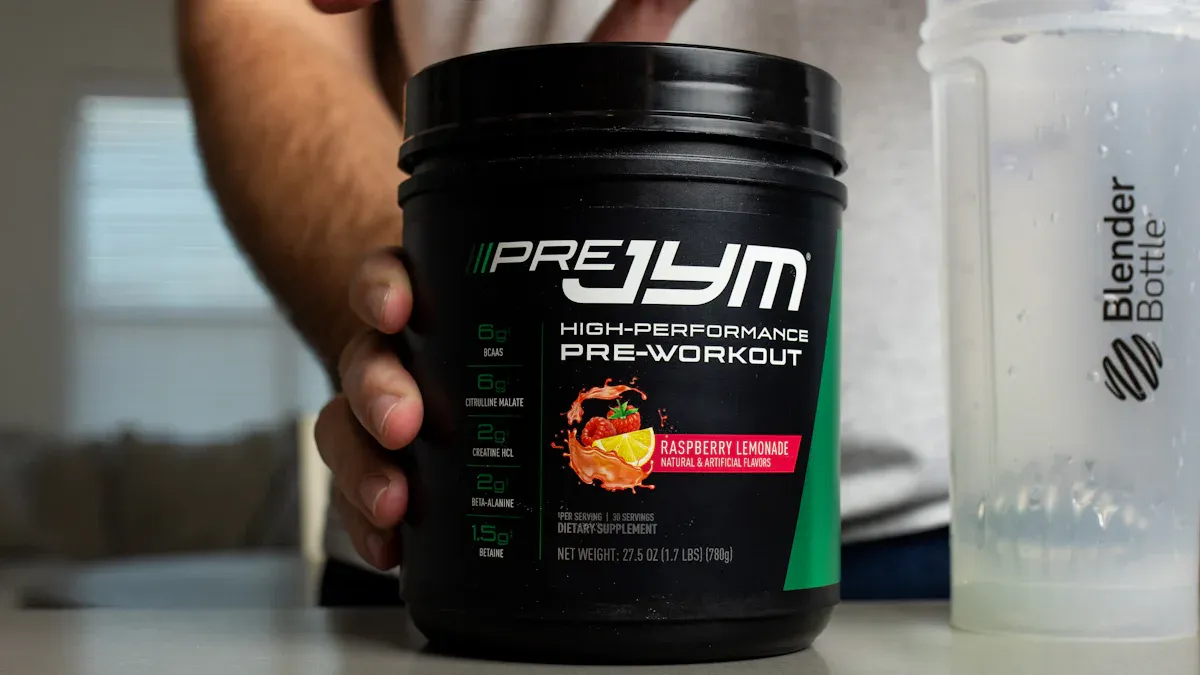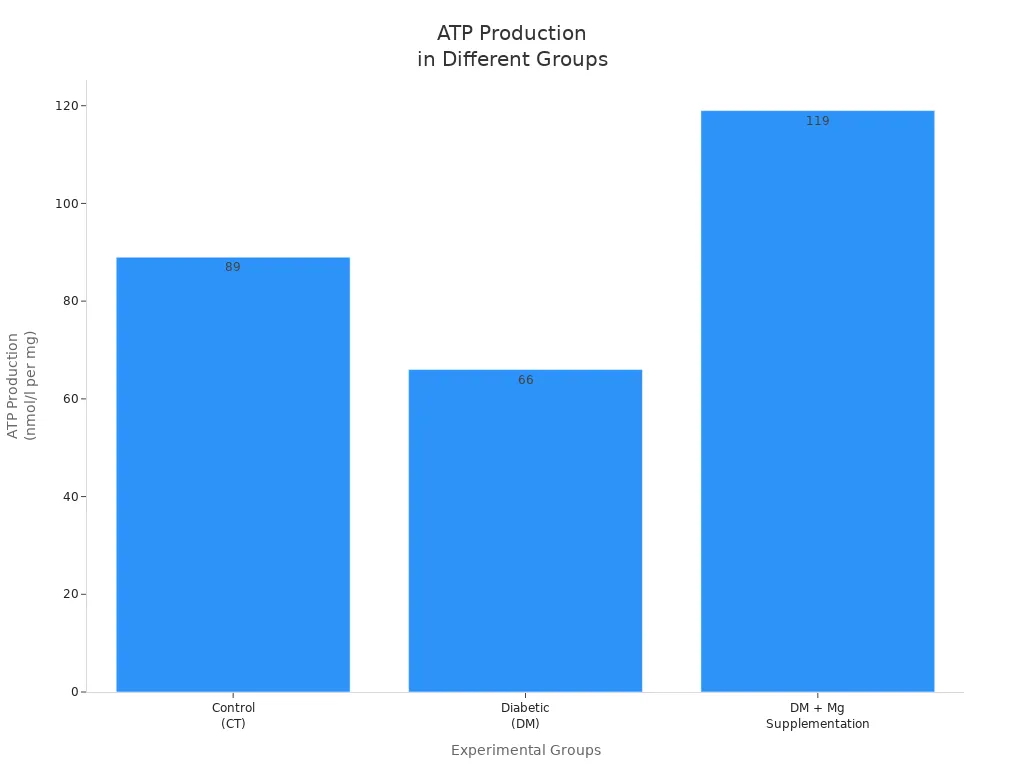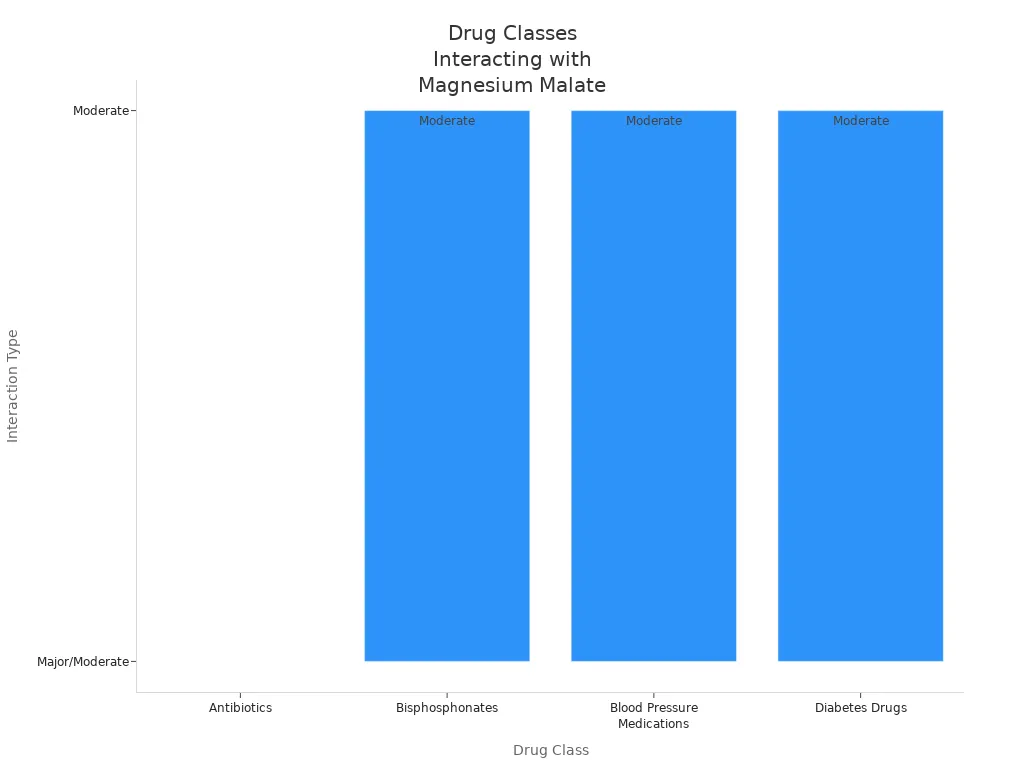Unlocking Energy: Can Magnesium Malate Help You?
Table of Contents

You want to feel more energetic and stay sharp throughout your day. Magnesium malate can help you unlock energy by supporting your body’s natural processes. Magnesium works with malic acid to produce energy inside your cells, improve muscle function, and help you think clearly. Check out the table below to see how magnesium malate boosts your performance:
| Benefit | Description |
|---|---|
| Mood Enhancement | Magnesium helps turn tryptophan into serotonin, which lifts your mood. |
| Energy Production | Malic acid helps your body make energy from food. |
| Athletic Performance | Magnesium improves how your muscles use glucose during activity. |
| Pain Relief | Low magnesium can cause muscle pain and tiredness. |
Unlocking Energy starts with understanding if magnesium malate fits your needs. Let’s find out together!
What Is Magnesium Malate?

Magnesium and Its Role
You might wonder why magnesium gets so much attention. Magnesium is a mineral your body needs every day. It helps your muscles move, keeps your heart beating, and supports your brain. Magnesium also helps your cells make energy, so you feel awake and ready for action.
Here’s what magnesium does inside your body:
- Helps your nerves send signals and muscles contract
- Keeps your heart rhythm steady
- Supports over 600 reactions, including DNA building and muscle movement
- Binds to ATP, the main energy molecule in your cells
- Moves important ions across cell membranes
- Helps your brain with memory and learning
Magnesium acts like a helper for enzymes that use ATP. Without enough magnesium, your body can’t make energy as well. You might feel tired or have sore muscles. Magnesium also helps your body recover after exercise and keeps your stress levels in check.
Why Choose Magnesium Malate?
Magnesium malate combines magnesium with malic acid. The chemical formula is C4H4MgO5. This form is made when magnesium joins with malic acid, which comes from fruits like apples. Malate helps your body turn food into energy, so pairing it with magnesium gives you a double boost.
Many people pick magnesium malate because it works gently and absorbs well. Compared to magnesium oxide, magnesium malate is easier for your body to take in. That means you get more energy and better muscle support. You’re less likely to get stomach upset or diarrhea, which can happen with other types.
Here’s why magnesium malate stands out:
- Supports ATP production for steady energy
- Helps muscles recover and function
- May ease muscle pain and soreness
- Gentle on your stomach
If you want to feel more energetic, recover faster, and avoid tummy troubles, magnesium malate could be a smart choice. You get the benefits of both magnesium and malate, helping you stay active and clear-headed every day.
Unlocking Energy with Magnesium Malate
Energy Production
You want to know how unlocking energy works inside your body. Magnesium malate gives you a boost by helping your cells make energy every day. Your cells use a process called the citric acid cycle to turn food into ATP, which is the main energy source. Malic acid is a key part of this cycle. It helps your body change nutrients into ATP, so you feel more awake and ready for action.
Magnesium steps in to activate ATP. Without magnesium, ATP cannot do its job. You need both magnesium and malate for strong energy support. Here’s how they work together for cellular energy production:
- Malic acid powers the citric acid cycle, turning food into ATP.
- Magnesium activates ATP, making it useful for your body.
- The combination of magnesium malate boosts energy metabolism, helping you feel less tired and more energetic.
- Magnesium malate acts as a cofactor for enzymes that help make ATP.
- It helps break down ATP and ADP, which keeps your energy levels steady.
You get more endurance and less fatigue when you use magnesium malate. Your body feels stronger, and you can keep going longer. This is unlocking energy at the cellular level.
Mitochondrial Health
Your mitochondria are like tiny power plants inside your cells. They make most of your energy. Magnesium malate keeps your mitochondria healthy, so you get steady energy support all day. When your mitochondria work well, you feel more energetic and recover faster after activity.
Let’s look at what happens when you add magnesium malate to your routine. Research shows that magnesium malate improves mitochondrial energy and helps your cells stay strong. Here’s a table that shows how magnesium malate changes mitochondrial function:
| Parameter | Control (CT) | Diabetic (DM) | DM + Mg Supplementation |
|---|---|---|---|
| ATP Production (nmol/l per mg) | 89 ± 6 | 66 ± 9 | 119 ± 10 |
| Mitochondrial Ca2+ Load | 1 | 3.71 ± 1.28 | Decreased |
| Mitochondrial ROS Overproduction | 1 | 1.7 ± 0.2 | Decreased |
| Mitochondrial Membrane Potential | 1.72 ± 0.18 | 0.65 ± 0.06 | Recovered |
| Mitochondrial Morphology | Normal | Disrupted | Improved |

You see that ATP production goes up with magnesium malate. Mitochondrial membrane potential recovers, and the shape of mitochondria improves. This means your cells make more energy and stay healthy. You get better energy support and feel less tired.
Magnesium malate also helps with muscle recovery. After exercise, your muscles need to repair and recharge. Magnesium malate reduces soreness and helps you bounce back faster. You feel ready for your next workout or busy day. Intense activity increases your need for magnesium, so adding magnesium malate can help you recover and keep your energy high.
Unlocking energy is not just about feeling awake. It’s about keeping your cells, mitochondria, and muscles strong. Magnesium malate gives you the energy support you need for daily life, better performance, and faster recovery.
Key Benefits for Daily Performance
Reducing Fatigue
Do you feel tired even after a good night’s sleep? Magnesium malate can help you fight fatigue and boost your energy. Your body needs magnesium and malate to make ATP, the main energy source for your cells. When you get enough magnesium, you feel less tired and more ready to take on your day. Malate works in the Krebs cycle, helping your body turn food into energy. Many people say they notice less fatigue and more stamina after adding magnesium malate to their routine.
Tip: If you struggle with muscle soreness or low energy, try adding foods rich in magnesium or consider a supplement.
Here are some reasons people choose magnesium malate for daily performance:
- High absorption rate for better energy production
- Gentler on your stomach, so you avoid digestive upset
- Often recommended for fatigue and muscle pain
Muscle Function and Recovery
Your muscles need magnesium to work well. When you move, magnesium helps your muscles contract and relax. Malate supports energy production, so your muscles get the fuel they need. If you exercise or stay active, you might notice muscle soreness. Magnesium malate helps reduce muscle soreness and supports muscle recovery. Studies show magnesium can lower inflammation, which helps your muscles heal faster. Better sleep, supported by magnesium, also helps your body recover after workouts.
Here’s how magnesium malate supports your muscles:
| Benefit | How It Helps You |
|---|---|
| ATP Production | Fuels muscle contractions |
| Reduces Fatigue | Keeps muscles working longer |
| Muscle Health | Eases muscle soreness and supports recovery |
Mental Clarity and Stress Relief
You want to stay focused and calm during busy days. Magnesium and malate help your brain work better. Magnesium supports memory and learning, while malate boosts energy for your brain cells. You may notice improved mental clarity and less stress when you get enough magnesium. Many people report feeling sharper and more relaxed. Magnesium also helps your body handle stress, so you feel balanced and clear-headed.
- Mental clarity improves with steady energy from malate.
- Magnesium helps your brain send signals and process information.
- Less muscle soreness means you can focus better and feel less distracted.
If you want less fatigue, better muscle recovery, and improved mental clarity, magnesium malate offers a gentle and effective way to support your daily performance.
Who Benefits from Magnesium Malate?
Active Lifestyles
If you love to stay active, you need strong muscles and steady energy. Magnesium malate helps your body make energy for every move you make. Athletes and people who exercise often use magnesium to support muscle function and speed up recovery. You might notice less muscle soreness and better performance when you get enough magnesium. Take a look at how magnesium supports your active lifestyle:
| Evidence Type | Description |
|---|---|
| Energy Production | Magnesium is essential for ATP synthesis, providing energy for muscle activity. |
| Muscle Function | It regulates calcium levels, crucial for muscle contraction and relaxation. |
| Recovery Support | Magnesium’s anti-inflammatory properties help reduce muscle soreness and damage post-exercise. |
| Performance Enhancement | Studies show magnesium supplementation improves muscle strength and endurance. |
| Aging Support | Magnesium may prevent muscle loss associated with aging by promoting protein synthesis. |
You can keep moving, recover faster, and feel stronger with magnesium malate.
Managing Fatigue
Do you feel tired all the time? Chronic fatigue can make daily life hard. Magnesium malate may help you fight fatigue and boost your energy. People with chronic fatigue syndrome or fibromyalgia often look for ways to feel better. Magnesium malate can help your body make more energy and reduce muscle pain. Some studies show it helps with muscle tenderness and fatigue in chronic fatigue syndrome. You may notice less muscle pain and more stamina. Magnesium is often part of a plan to manage chronic fatigue, especially if you have low magnesium levels.
Note: If you struggle with chronic fatigue, magnesium malate could be a gentle way to support your energy and muscle health.
- Magnesium malate is recognized for its potential benefits in managing chronic fatigue, especially in chronic fatigue syndrome and fibromyalgia.
- It may enhance energy production and reduce muscle fatigue, although results can vary.
- Some studies show magnesium malate can lower muscle pain and tenderness in fibromyalgia.
- Experts suggest magnesium may help some people with chronic fatigue syndrome, especially those with magnesium deficiency.
- Magnesium is often recommended as part of a full management plan for chronic fatigue syndrome.
Magnesium Deficiency
You might not know if you have enough magnesium. Many people do not get enough from food. Magnesium deficiency can cause muscle cramps, fatigue, and irregular heartbeat. About 2.5% to 15% of Americans have low magnesium. The risk is higher if you have diabetes, stay in the hospital, or need intensive care. If you notice muscle cramps or feel tired often, you may need more magnesium. Magnesium malate is gentle and easy to absorb, making it a good choice for people with deficiency.
- Hypomagnesemia affects 3-10% of the general population.
- 10-30% of people with diabetes have low magnesium.
- 10-60% of hospitalized patients show deficiency.
- Over 65% of ICU patients lack enough magnesium.
- Symptoms include muscle cramps, fatigue, and irregular heartbeat.
If you want to support your muscles, fight chronic fatigue, and keep your energy steady, magnesium malate could help you feel your best.
Safe Use and Precautions
Dosage and Timing
You want to get the most out of magnesium malate, so knowing how much to take and when is important. Most healthy adults need between 310 and 420 mg of magnesium each day. Many studies suggest that a daily dose of 300–450 mg works well for most people. The right amount depends on your age, sex, and health needs.
- Adults aged 19 and older: 310–420 mg of magnesium daily
- Typical supplement dose: 300–450 mg per day
Magnesium malate has high bioavailability, which means your body absorbs it well. This helps you get the most benefit with less risk of stomach upset. You can take magnesium malate in the morning to boost your energy for the day. Some people like to take it in the afternoon to fight off that midday slump. Because of its high bioavailability, you may notice the effects quickly.
Tip: Take magnesium malate with food to help your body absorb it and lower the chance of stomach discomfort.
Side Effects and Warnings
Most people handle magnesium malate well, but you should know about possible side effects. Some people may feel digestive issues like diarrhea, bloating, stomach cramps, or nausea. If you take too much magnesium, you could get low blood pressure, weakness, or even heart problems.
- Digestive issues: diarrhea, bloating, cramps, nausea
- Too much magnesium: low blood pressure, face flushing, weakness, heart issues
Magnesium malate is generally safe for most people when you stick to the recommended dose. Health experts say it is safe for pregnant women, breastfeeding moms, and children. Still, taking too much can cause problems like an irregular heartbeat.
| Drug Class | Examples | Interaction Type |
|---|---|---|
| Antibiotics | Doxycycline, ciprofloxacin | Major/Moderate |
| Bisphosphonates | Fosamax, Actonel | Moderate |
| Blood Pressure Medications | Calcium channel blockers | Moderate |
| Diabetes Drugs | Glimepiride, glyburide, glipizide | Moderate |

You should talk to your doctor if you take antibiotics, bisphosphonates, blood pressure medicine, or diabetes drugs. Magnesium can change how these medicines work. Always check with a healthcare provider before starting a new supplement, especially if you have kidney problems or take other medications.
Note: Stick to magnesium doses under 350 mg unless your doctor tells you otherwise.
You want more energy and better clarity every day. Magnesium malate helps your body make ATP, which boosts your energy and supports muscle function. You get clarity in your thinking and feel less tired. Magnesium malate works in over 300 reactions, helping with muscle movement and blood pressure. You notice clarity in your focus and less stress. Picking the right supplement gives you clarity about your health needs. You should talk to a healthcare provider for clarity on your magnesium levels. A balanced diet may give you enough magnesium, but clarity comes from knowing what your body needs. Take charge of your energy and clarity—your best days start now!
- Magnesium malate helps with energy production and clarity in daily life.
- It supports clarity in muscle recovery and mental focus.
- You gain clarity by consulting a professional before starting any supplement.
You deserve clarity and steady energy. Make choices that help you feel your best!
FAQ
What makes magnesium malate different from other magnesium supplements?
You get both magnesium and malic acid in one supplement. This combo helps your body make energy and supports your cognitive health. Many people find magnesium malate easier on the stomach than other forms.
Can magnesium malate improve my cognitive function?
Yes! Magnesium malate supports your brain by helping nerve signals and energy flow. You may notice better focus, memory, and overall cognitive performance. Many people say they feel sharper and more alert.
How does magnesium malate help with cognitive fatigue?
Magnesium malate boosts ATP production, which powers your brain cells. When you feel mentally tired, this supplement can help restore your cognitive energy. You may find it easier to concentrate and think clearly.
Is magnesium malate safe for daily use?
Most people can take magnesium malate every day. It supports your muscles, energy, and cognitive health. Always check with your doctor if you take other medicines or have health concerns.
Who should consider magnesium malate for cognitive support?
You might benefit if you want better focus, memory, or mental clarity. Students, busy professionals, and older adults often use magnesium malate for cognitive support. It helps your brain stay sharp and energized.
Tip: If you want to boost your cognitive health, try adding magnesium malate to your routine!

Poseidon
Master of Nutritional Epidemiology, University of Copenhagen, Herbal Functional Nutrition Researcher
Focus: The scientific application of natural active ingredients such as Tongo Ali, Horny Goat Weed, and Maca to sexual health and metabolic regulation.
Core Focus:
Men: Use a combination of Tongo Ali (an energizing factor) + Maca (an energy reserve) to improve low energy and fluctuating libido.
Women: Use a combination of Horny Goat Weed (a gentle regulator) + Maca (a nutritional synergist) to alleviate low libido and hormonal imbalances.
Stressed/Middle-Aged Adults: This triple-ingredient synergy supports metabolism, physical strength, and intimacy.
Product Concept:
Based on traditional applications and modern research (e.g., Tongo Ali promotes testosterone-enhancing enzyme activity, and icariin provides gentle regulation), we preserve core active ingredients and eschew conceptual packaging—using natural ingredients to address specific needs.
Simply put: I'm a nutritionist who understands "herbal actives." I use scientifically proven ingredients like Tongo Ali, Epimedium, and Maca to help you make "sexual health" and "nutritional support" a daily routine.
